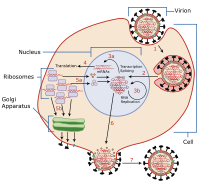
Back دورة حياة الفيروس Arabic Cicle vital dels virus Catalan چرخه زندگی ویروس Persian Daur hidup virus ID ウイルスのライフサイクル Japanese Ciclo de vida viral Portuguese Репликативный цикл вируса Russian Viral life cycle SIMPLE Viral hayat döngüsü Turkish
This article needs additional citations for verification. (December 2020) |
| Influenza virus life cycle |
|---|
 |
Viruses are only able to replicate themselves by commandeering the reproductive apparatus of cells and making them reproduce the virus's genetic structure and particles instead. How viruses do this depends mainly on the type of nucleic acid DNA or RNA they contain, which is either one or the other but never both. Viruses cannot function or reproduce outside a cell, and are totally dependent on a host cell to survive. Most viruses are species specific, and related viruses typically only infect a narrow range of plants, animals, bacteria, or fungi.[1]
- ^ N.J. Dimmock et al. Introduction to Modern Virology, 6th edition. Blackwell Publishing, 2007.
© MMXXIII Rich X Search. We shall prevail. All rights reserved. Rich X Search